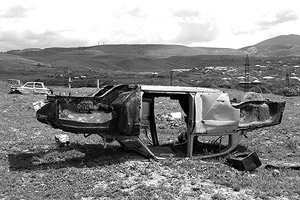Recently, I asked one of the officials of Karabagh, who is also an MP
of the National Assembly of Karabagh, what was to become of the
Karabagh conflict: “Everything is over”, he said very briskly. “Even
the Turks know that it’s over”.
He was obviously talking about the war and the positive effects it had
on our nation. But I was neither asking about the war nor the strategic
importance it played for us. I wanted to know if whether or not there
would be peace and any development in the country. Also, I wanted to
know if people would be living in a battlefield if there was no
establishment of peace.
When talking about peace, you start dealing with the impossibility of
making sacrifices. “Don’t worry about it,” said one man in response to
the question about peace. He and his family had suffered a lot and he
gave this answer with enthusiasm. “We’re still here,” he adds. He told
me a story depicting one of the episodes of war where both sides
suffered losses-eight dead and three wounded.
It’s okay if the man doesn’t have the basic conditions for living. It’s
okay if he barely takes care of himself and his son’s three children
with the small subsidy he receives from the government and by begging.
The important thing is to live with the fact that you may die a hero.
One thing keeps on getting repeated by different levels of society in
Karabagh. They say that Karabagh has already ceded by declaring
ceasefire. This means that we have already agreed to peace by depriving
ourselves from “eternal war”. Why do we continue talking about
returning the lands anyway?
Generally, the people of Karabagh needed to be the ones demanding
peace, but it seems as if peace is just a political term for them and
the people using that word are the ones who are suspected of being
cowards, weak, and also, traitors. It turns out that if you want peace,
then you want to return the lands by fighting in a war.
As you take a trip around Karabagh, you notice that the people are not
living, but rather, they are waiting for something to happen and it
doesn’t matter whether it is something good or bad. They are simply
waiting, just like a man in his prime waits until he finds a suitable
job so he can buy a house, a car and then get married. But as soon as
he has the house and the car, he comes to the conclusion that he
doesn’t want to get married. This is one case. The other one is that
the man doesn’t find a job and he remains unemployed, and since he is
already old enough to be on his own, his parents force him to get
married so that there will be someone by his side to help him get out
of the depression and the psychological stress.
While going around Karabagh you see that people are waiting for some
kind of status. Status, looked at as a political term, is more
significant than the word peace. This can be understood by the fact
that when people living in Karabagh say peace, they refer to the life
they have seen before 1988, also known as the Autonomous Region of
Mountainous Karabagh. Having a status is far from becoming a reality in
Karabagh. Besides that, it does not correspond to the de facto
situation in Karabagh.
When you ask ordinary citizens from the city or the village about the
well-being of Karabagh, you never get one reply. “Either we join
Armenia, or we stay independent”. This answer is also political. This
and other types of answers are ones that are talked about in wide
political discussions.
When you ask the citizens which part of the answer they prefer, the
villagers prefer joining Armenia while people living in the city prefer
staying independent. Ordinary people want to join Armenia, while for
officials who have a good status, being independent is something like
egoism. This is self-explanatory. There is a huge difference in status
when you compare someone who works as a head of the administrative
department of some ministry in Karabagh and someone who is head of the
department of one of Armenia’s regional districts.
Perhaps the importance of having some status is the reason why Karabagh
is constructing a building for the National Assembly in the heart of
Stepanakert instead of using its minimum resources for providing
humanitarian aid. One time, in response to the question about the
construction of villas, former Prime Minister of Karabagh Robert
Kocharyan said that the construction of villas gives hope to the
people. This means that if commanders of the army and other officials
start building villas then the people can live happily. Now everyone
can say that the National Assembly construction instills hope in
people. It does instill hope, but not for living, but rather, for
obtaining a status.
A businessman complains that he can’t find any worker due to the
unemployment. “There is nothing to be surprised about,” he said in
response to my question that followed. “Everyone here receives help
from Armenia, Russia or other places and they only want to work as
government officials.” Judging from this response, we can say that
working is also a status, and not a means of earning money.
Upon coming back from Karabagh with my impressions, the next morning
all the newspapers were writing about the chaotic situation in Javakhk.
Javakhk’s political parties were demanding autonomy for some reasons
and those reasons were similar to the ones given in 1988 for Karabagh.
One of the reasons included the social/economic situation of the
Armenians living in Javakhk. “Either death or freedom”, I thought and
imagined how the political parties and the people driving the Jeeps
were making their way through the ruined villages and the uncultivated
lands of Javakhk.

